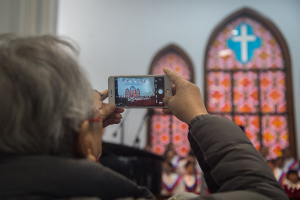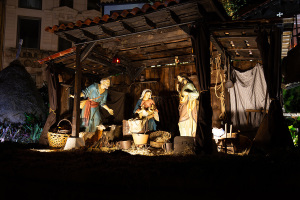Christian Right Not Dead, But Maturing, Say Authors
WASHINGTON – Two influential and younger leaders of the Christian right on Wednesday rejected the idea that the religious right is dying, and instead argued that it is alive and growing.
Bishop Harry R. Jackson Jr. and Tony Perkins, co-authors of Personal Faith, Public Policy, contend that the Christian right is undergoing a changing phase which includes expanding its public policy agenda, detaching itself from the Republican Party, and adjusting to a new multi-racial image.
"Our movement is not dead," said Jackson, chairman of the High Impact Leadership Coalition and senior pastor of Hope Christian Church in the Washington, D.C. area. "Our movement is maturing," he said at an event promoting his new book.
Jackson and co-author Perkins maintain that the Christian right needs to expand its influence to address immigration policy, poverty and social justice, racial reconciliation, and global warming – issues commonly associated with the Christian left – to adapt to the "changing political environment."
However, they emphasize that the Christian right's deeply cherished pro-life and pro-family agenda will still be at the heart of the movement.
"There remains a prioritization of those issues and life remains top of the list," Perkins stated. "Marriage, which we saw was a turning issue in the 2004 election, remains a very important issue."
But he added, "By no means are Christian voters, evangelicals single issue."
The Christian right leaders' call to expand the agenda was readily received by panelists the Rev. Jim Wallis, who represented the Christian left, and the Rev. Samuel Rodriguez, who considers himself an evangelical centrist.
Wallis, president and executive director of Sojourners, spoke about the need for the Christian right to be more vocal and aggressive on tackling poverty. He urged the religious right to see poverty and hunger as a life issue and move beyond the understanding that being pro-life simply means being anti-abortion.
Meanwhile, Rodriguez drew attention to the fast-growing Hispanic evangelical population that refuses to be labeled as either the Christian right or left.
Rodriguez, president of the National Hispanic Christian Leadership Conference (NHCLC), pointed out that people would be "hard-pressed" to find a Hispanic evangelical that would identify with the Christian right even though studies have shown that Hispanic evangelicals are more pro-life and pro-family than even white evangelicals.
"We (Hispanic evangelicals) want to be center," Rodriguez said. "I think the future of American evangelicalism will not be right or left, but will be center. We will reconcile the righteousness platform that Bishop Harry Jackson alluded to previously, with that justice platform."
The NHCLC president contends that the "browning of the church" will challenge the notion of Christian right and Christian left and will shift American evangelicalism to resist the label of "right or left, red state or blue state, Democrat or Republican."
In their book, Jackson and Perkins also encourage evangelicals to open themselves up to both political parties and be a so-called political "free agent." They state in the book that not aligning themselves with a party "could prove to have a much greater impact on actual public policy."
"As a result of the broadening of the evangelical movement, both political parties will increasingly have to compete for support of evangelicals to succeed," Jackson and Perkins wrote. "This, we believe, will ultimately result in policies that are more faith-friendly."



























